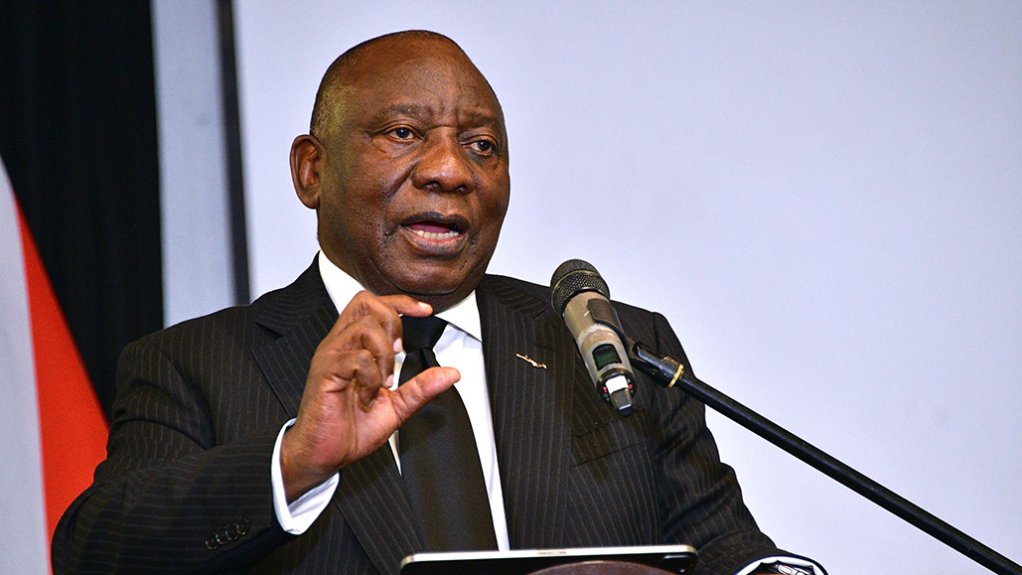As South Africa hosts the Climate Resilience Symposium this week at the Council for Scientific and Industrial Research, in Pretoria, the country’s vulnerability to the effects of climate change has already become evident, demonstrating the need to speed up and bolster initiatives to mitigate this.
This would also require considerable financial resources, President Cyril Ramaphosa noted in a keynote address at the symposium.
The day was concluded with the launch of the Presidential Climate Commission’s (PCC’s) ‘Recommendations on a Just Transition Financing Mechanism’.
The launch presented key findings and recommendations of the report and highlighted the importance of South-South and regional cooperation in achieving climate resilience and a just energy transition (JET).
Meanwhile, University of the Witwatersrand Global Change Institute Dr Francois Engelbrecht told delegates attending the symposium that the Southern African region was likely to become generally drier, and that when this occured, options for adaptation would be limited, given that the areas would already be warm, dry and water-stressed.
He pointed out that the region could expect more frequent, long-lasting droughts co-occurring with heatwaves of unprecedented intensity.
Ramaphosa said the storms experienced by the Western Cape last week were the most recent example of the impacts of climate change.
Moreover, he said that it showcased that climate change was more than just a scientific, social justice, human rights and development issue, but also an economic one, with the storms having disrupted ports and cargo, resulting in a knock-on effect in other sectors, such as agriculture.
Turning to South Africa, the World Bank put the cost of the country’s energy transition at at least $500-billion by 2050, of which $140-billion would be needed before 2030. It had also emphasised the importance of securing financing from the international community and of mobilising private capital.
Ramaphosa pointed out that climate change disruptions had an impact on taxes, and responding to these put a strain on public finances, and therefore, the National Treasury was pivotal to responding to this, as well as capitalising on opportunities to use the JET as a means of building a more sustainable economy.
As such, the symposium, which was convened by stakeholders including Treasury, the Finance Minister and the PCC, focused on the integration of climate goals into macro-fiscal and finance policy, and mainstreaming climate change considerations into the intergovernmental fiscal system.
Ramaphosa emphasised the importance of the country strengthening its systems for adaptation and mitigation, building resilience in communities and accelerating its decarbonisation efforts and the pace of the JET.
He also warned of the need to be cognisant of the fact that the country’s dependence on coal was unsustainable, with global instruments to curb carbon emissions putting it at risk of becoming uncompetitive.
However, Ramaphosa emphasised that the JET must be undertaken at a scale and pace that was affordable to the country – balancing the economic priorities with ensuring that people’s livelihoods were secured.
He also called for the pursuit of a green industrial agenda.
“Investments in green infrastructure, renewable energy and climate adaptation measures can be costly, requiring careful financial planning and prioritisation, Ramaphosa said, adding that inclusive growth was being prioritised to mitigate this.
Ramaphosa also highlighted that a carbon tax was a crucial component of the country’s mitigation strategy to lower greenhouse-gas emissions.
“By internalising the cost of carbon emissions, the carbon tax incentivises companies to reduce their carbon footprint and invest in cleaner technologies. The carbon tax also generates revenue for climate initiatives. These funds can be reinvested in renewable-energy projects, energy efficiency programmes and social support mechanisms,” he posited.
He mentioned that the JET Investment Plan set out a quantified investment plan of about $98-billion, which would drive investments in the electricity grid, green hydrogen, electric vehicles, economic diversification and skills development, among other priorities.
He stressed that these investments must include impacted communities and stakeholders.
In terms of boosting climate finance, Ramaphosa said the Department of Forestry, Fisheries and the Environment was working with the PCC on recommendations for the Climate Change Response Fund and an Adaptation and Resilience Investment Plan to accompany it.
Ramaphosa also called on international partners to honour their commitments in terms of mitigation and adaption financing. He bemoaned that these often did not materialise or were overly complicated when they did.
Ambassadors from Switzerland, France and the US expressed their support for the country’s JET ambitions.
Ramaphosa also highlighted the importance of the National Treasury’s Climate Finance Strategy to mobilise public and private capital and incentivise sustainable practice.
Ramaphosa called on South African business to invest in projects required for a successful JET.
He said there was a need to use blended fiancé to unlock private sector flows.
Ramaphosa also emphasised the need for a credible project pipeline to access funding.
EMAIL THIS ARTICLE SAVE THIS ARTICLE ARTICLE ENQUIRY
To subscribe email subscriptions@creamermedia.co.za or click here
To advertise email advertising@creamermedia.co.za or click here











